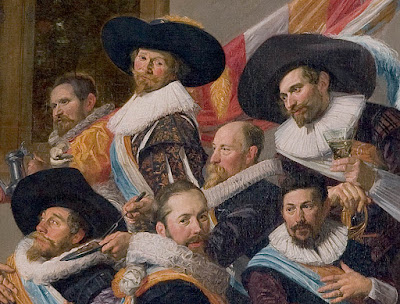I'll eat my hat.
No, no, sorry to disappoint you, dear readers, but I won't. However, I do wonder about the origin of this expression. Did it arise when hats were small (and perhaps, boilable)? Or during some era when big, fancy hats with enthusiastic plumage was popular (yuck!)?
Time to put on my thinking cap/hat and do a little digging...
>
>
>
>
>
>
>
>
>
>
>
>
>
According to The American Heritage Dictionary of Idioms by Christine Ammer, the phrase eat one's hat, meaning to "declare one's certainty that something will not happen or is untrue," appeared in the first half of 1800s. Ammer offers up an 1837 quote from Charles Dickens' Pickwick Papers: "If I knew as little of life as that, I'd eat my hat and swallow the buckle whole."
The Today I Found Out website has a nice post exploring the expression, including this bit:
According to the venerable Oxford English Dictionary, the earliest known example of the phrase comes from the 1762 book Homer Travestie, by Thomas Bridges. The book is a parody of the more famous Iliad and contains a line that reads: "For though we tumble down the wall, And fire their rotten boats and all, I’ll eat my hat, if Jove don’t drop us, Or play some queer rogue’s trick to stop us."
The poster goes on to say that Bridges probably didn't coin the phrase so much as switched it up from an older expression: I'll eat Old Rowley's hat.
Whaaat (or whooo) is Old Rowley?? And what was special about this this hat? Luckily for me, the post continues:
As for who “Old Rowley” was, this may be referring to King Charles II who was called such owing to his reputation with women combined with the fact that “Old Rowley” was the nickname of one of the King’s prized stallions. This is referenced, among other places, about a century after Charles II’s death in The Biographical History of England (1775)...As for why the saying specifically mentioned the king’s hat instead of, say, his shoes or his underwear, this is speculated to be due to the king’s fondness for fabulously flamboyant hats which would be exceptionally difficult, if not impossible, for a person to eat.
The Phrase Finder says essentially the same thing, mentioning a dubious alternative origin based on the possibility that "hatte" was a medieval word for a veal pie. However Phrase Finder has its doubts, adding:
...Pies can be eaten, certainly, but these 'hatte' pies were a 15th century creation and the word was never in sufficient circulation for it to have been recorded in the OED, which claims, with good reason, to be 'the definitive record of the English language'. Nor does 'eat my hat' appear in print until 200 years after the last person ate a hatte. Also, 'eat my hat' has always meant 'submit myself to something unpleasant if I prove to be wrong'. Eating veal pies is far from unpleasant, and so the supposed derivation doesn't match the meaning.
I looked at the hats from the time of Charles II, and must say that eating one of those looks VASTLY more unappetizing than devouring a meat pie...
 |
| Don't even think about eating THESE hats! By Frans Hals - Frans_Hals_015.jpg, Public Domain, https://commons.wikimedia.org/w/index.php?curid=17607317 |













4 comments:
What amazes me about some of the Slang-o-rama expressions is how far back they go. Didn't "we" invent any of them? I know! ASAP and LOL :=)
Large enough to cause Mad Hatters Disease.
https://en.m.wikipedia.org/wiki/Erethism
Hi Camille! I do tend to pick the "old" bits of slang... :-} Plenty of newer stuff out there. Maybe I should delve into 1960s slang. Oh, that's actually considered historical these days, isn't it... :-)
Hi Liz! Very cool link, thanks! I did touch a little bit on mercury poisoning in MERCURY'S RISE, but no hatters were involved... :-)
Post a Comment